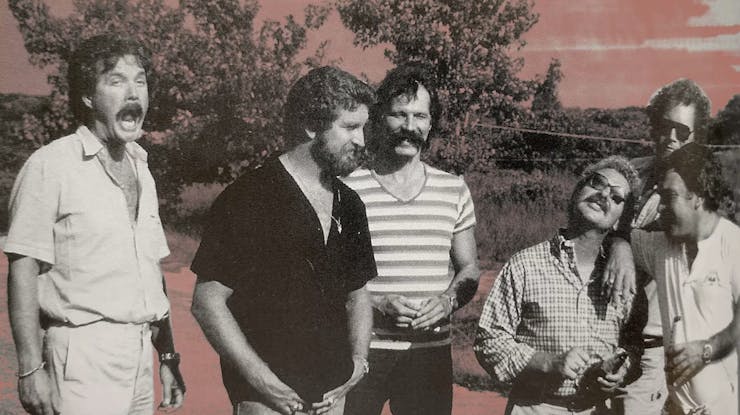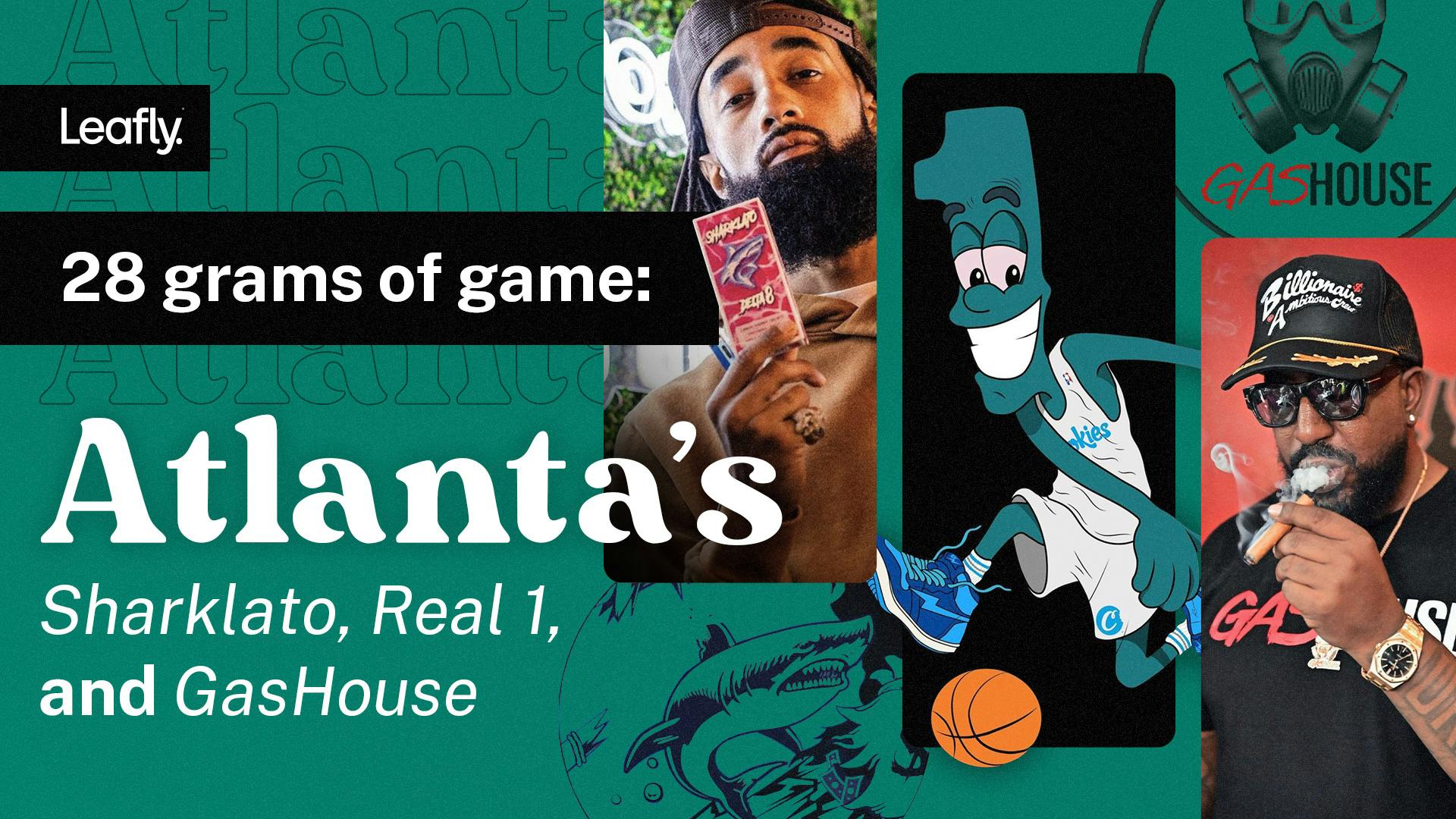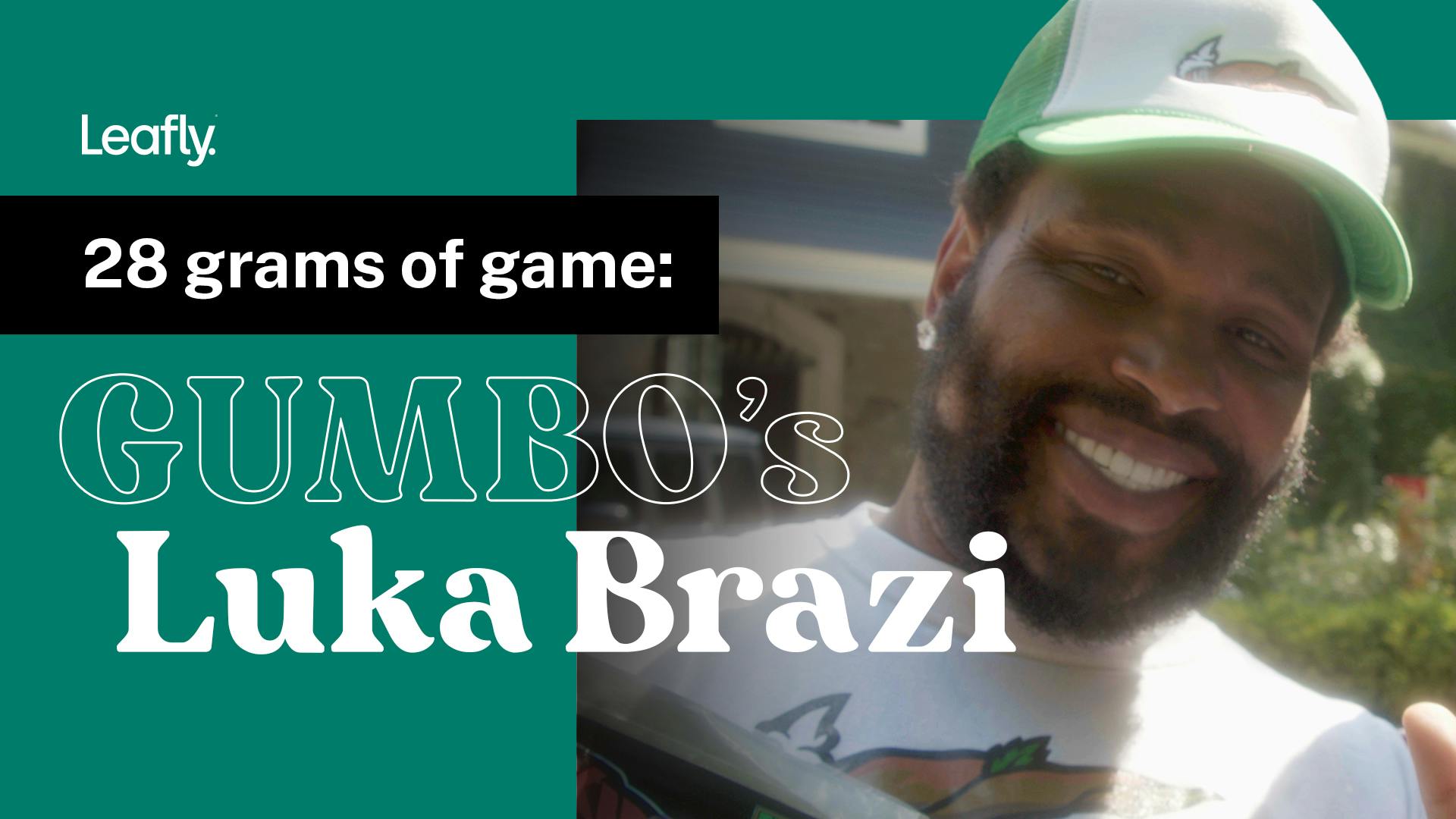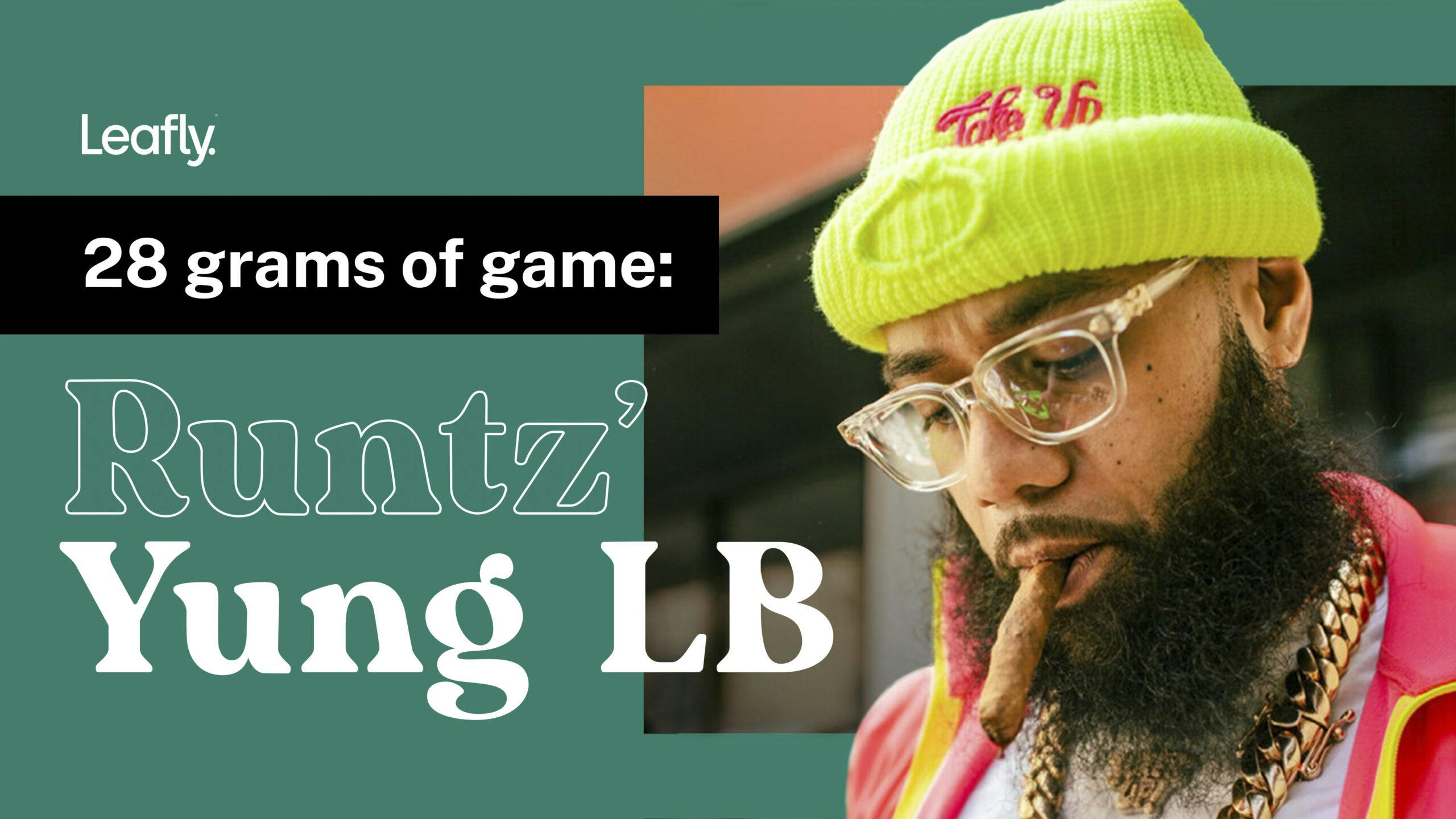Meet South Carolina’s legendary cannabis importers: The Gentlemen Smugglers. Here’s how they went from the first targets of Reagan’s War on Drugs to legal operators with a brand that captures their legacy.
At 21, Barry Foy made his first million dollars on the open sea. He was the ringleader of a cannabis smuggling ring that Federal agents dubbed “the gentlemen smugglers,” because they were mostly college-educated “good ole boys” from South Carolina. They went to school with the current governor, Henry McMaster, and led the former US Attorney on a cat and mouse chase for years before McMaster realized his targets were old friends.
After a 15-year run, McMaster took the crew down in the sting that started the War on Drugs. The joint operation between the IRS, DEA and FBI land Foy, the leader, an 18-year sentence, which he served 11 of. The story is meticulously told in 2011’s Jackpot, a Wall Street Journal Bestseller by Jason Ryan, and is in production to become a documentary series.

Now 50 years after their first run, Foy is leading the Smugglers on a new expedition into uncharted waters. His legal brand Gentlemen Smugglers is available in Massachusetts dispensaries, with more states to come. And despite legalization, the stakes are higher than ever.
After a lifetime-served on the run or behind bars, and with most of Foy’s fellow smugglers retired or deceased, it’s now or never for the last gentleman standing. Now in his 70s, Barry is still pushing it to the limit. All to ensure the smugglers’ story lives on in proportion to their legacy footprint.

For this installment of 28 grams of game, Leafly hit South Carolina’s Edisto River with Foy to see the backwater routes his team once used to move over 200 tons of grass and hash undetected. Here’s what we learned along the way.
1. Go with the flow

The unsteady state of the cannabis industry intimidates many investors and operators. But Barry Foy is used to leading unsure voyages with confidence. He’s already moved more wholesale pot than nearly anyone else on the East Coast, and under much rougher conditions than today’s licensed operations. That’s because when smuggling, if the boat gets stuck, someone misreads a tide, or it’s the middle of the night and they’ve got the chart wrong, they could end up lost at sea or in custody.
One of the Gentlemen Smugglers’ first trips to Jamaica included a leak that had Barry and crew shoveling water out of their boat for hours to stay afloat. So while the legal cannabis game is now far more competitive than the isolated canals the smugglers took in the 1970s and 80s, few can match the risk tolerance Foy’s built over the years. That’s why it’s so easy for him to go with the tide as the legal industry ebbs and flows. And why it’s no surprise the Gentlemen Smugglers’ unofficial motto is #enjoytheride.
2. Teamwork makes the dreamwork

Foy played basketball in college and understands how to lead a team with the control of an elite point guard. As a young smuggler, he shined while leading older peers on potentially life-threatening missions at sea.
Decades later, at the peak of COVID-19-induced uncertainty, Foy recruited a new team of extraordinary gentlemen to paint a modern portrait of the smugglers’ adventures. Since the plant is now legal, Foy knew selling it would be relatively easy. The challenge of today’s weed game is building out a brand. A brand that resonates as deeply with smokers worldwide as the smugglers’ journey does in rural communities up and down the East Coast.
Shop highly rated dispensaries near you
Showing you dispensaries nearTo help paint the picture, Foy brought on globe-trotting multimedia producer/editor Kevin Harrison along with New York-native Thomas Cutler, a corporate television executive who helped pioneer the true crime genre. Harrison and Cutler both spent time in Charleston, South Carolina and quickly learned the legend of the Gentlemen Smugglers by word of mouth. They were local legends in a state that still prohibits the plant. And to Harrison and Cutler, the story felt like a mix of Breaking Bad and Cocaine Cowboys with even more layers and characters to explore.
3. Take them to your leader

From day one to today, the star of the show has always been Barry “Flash” Foy. “Barry’s a leading man,” Cutler explained, drawing on his own storytelling expertise to properly cast and frame the Gentlemen Smugglers’ story for today’s binge-streamers. Cutler compares Foy’s complex charisma to Tony Soprano, who is relatable, even likable, but still capable of dark turns that your average viewer can only imagine having to navigate.
“I don’t wanna set them up like they’re these perfect guys,” Cutler said over coffee in downtown Charleston. “Everyone has issues, has fallacies, has problems–A good side and bad. But when we first got Barry on camera, I knew he was a star in a second. Just because of my TV background, (I saw) how quick he was with a turn of phrase,” Cutler explained.
4. Gentlemen finish first

“Asshole or gentleman? Gentleman sounds a whole lot better to me.”
Barry “Flash” Foy
The smugglers didn’t operate like pot pirates, aside from the questionable hygiene that sometimes arose on long trips. “All these guys went to college, they all knew each other in college, and Barry was very well-traveled and charismatic,” Cutler said. “The stereotypical kingpin is not the kind of person I’d want to hang out with, but Barry was very much the opposite. Because he wasn’t talking about himself. He wasn’t saying, ‘Look what I did.’ This is a passion for him, but it’s also a business.”
5. When in doubt, take charge
When they started smuggling, Foy put on his CEO hat and said, “I was running a corporation.” Cutler said it reminds him of Breaking Bad’s blurred lines, “but forget the meth and the murder.” At the core, it’s about a man with a plan taking full measures to achieve it.
“Once I got to know the law enforcement side of all the folks that were after them, it’s also like Catch Me If You Can, what they did to stay one step ahead,” Cutler explained, referring to the one degree of separation between the smugglers and Gov. Henry McMaster, the former law enforcement agent that chased them for years.

The current team thinks viewers will love the Robin Hood morals Foy and the smugglers operated with. They weren’t violent. If someone crossed them, they would simply X them out of future deals. Foy and crew were too busy for brutality. All of their time was spent smoking weed and weighing money piles that were too thick to count by hand.
6. Know the law

Operation Jackpot was the first presidential sting in the Drug War. The Gentlemen Smugglers were the target, and over 100 men and women were eventually sentenced. They were able to evade enforcement for years because of the sophisticated maze of waterways that line the Carolina coast.
As natives, Foy, Les Riley, and Bob Byers knew exactly how to stay ahead of the coast guards and local authorities. It took a historic first-time collaboration between multiple federal agencies to connect the dots that landed the smugglers behind bars. Operation Jackpot wasn’t just the Drug War’s first major sting. It was also the first time the FBI, IRS, and DEA worked in unison.
7. Keep your enemies close

South Carolina Gov. Henry McMaster led the investigation against the smugglers. As Reagan’s United States attorney choice, McMaster chased the Gentlemen Smugglers for years without realizing he knew them personally. “We had a lot of marijuana and hashish, and we didn’t know who was bringing it in,” McMaster said in the sizzle reel for the Gentlemen Smugglers docu-series, which can be viewed here.
“President Reagan gave me a green light to innovate and do things that had not been done before.” Gov. McMaster said the plan was to “go find people spending more money than they could possibly be making.”
8. Know the stakes
When the smugglers were making runs, they were fully aware of the potential consequences. Still, with each trip they raised the stakes—Like venturing to the middle eastern nation of Lebanon during a Civil War to export hashish. But Foy and the smugglers paid the ultimate price when the authorities finally caught up to them.
For all of the eighths of weed he snuck into the states, Barry Foy served about one-eighth of his life behind bars, living a Shawshank Redemption-esque existence years before legalization was a realistic notion.

9. Politics are crucial
On the inside, Foy had the protection of Italian mobsters. They took a liking to him because of favors he pulled off while working in the prison’s kitchen. Foy used his keen people skills to win friends and influence people behind bars, just like he did on the water.
While working in the kitchen, he made sure the Italians got served the best food, and first. He also smuggled olive oil and other highly-valued contraband with the help of kitchen workers who weren’t incarcerated and could bypass certain security checks.
The risks paid off, helping Foy survive his time with his peace of mind. Today, the stakes are set by father time, with Foy, Cutler, and company pushing to cement the Gentlemen Smugglers’ legacy through quality content and legal cannabis products.
“30, 40 years ago the stakes were jail, plain and simple: You get caught, you go to jail—which they did. I think the stakes now are more on the business side. I mean, truly all of us are involved in the business side. Barry, Willie, Tammy, Skip, the whole team, there’s an element of legacy of telling their story. And then there’s certainly an aspect of entertainment because it’s fascinating. It’s riveting.”
Thomas Cutler, media executive, Co-Producer of Gentlemen Smugglers docu-series
10. Protect your legacy

With his former smuggling partner Les preferring to stay behind the scenes, and their third partner Bob Byers passing away behind bars, Barry is now carrying the torch for one of the East Coast’s richest legacy cannabis operations. And he’s still running a tight ship to this day, overseeing each element of cannabis and content production to make sure they live up to the standard he and the smugglers set back in the day.
11. Use your network wisely
The Gentlemen Smugglers weren’t above using their state’s “good ole boys” network to enable their smuggling. For one of their first trips to Jamaica, Barry went through a lawyer friend to get a corrupt local judge to vouch for them when they needed a reference to buy a boat. “Them boys are fine, go ahead and give them that boat,” the judge said over the phone.
12. Follow the money
The smugglers were so good at evading law enforcement that it took financial records to prove what they were doing in court. McMaster used a “net worth” approach to identify their crimes by comparing the cost of their homes and assets with their stated income.
The strategy brought the Internal Revenue Service, US Customs, The Drug Enforcement Agency, and the Federal Bureau of Investigation into the fold. At the time, it was unprecedented for the agencies to share information or work in concert. But they were limited by 1970s surveillance, which was incapable of tracking the endless miles of coastline curled along the state’s eastern seaboard.
13. Stay under the radar

“It was virtually impossible to catch them in the act. We decided to figure out who they were and catch them at home.”
Gov. Henry McMaster, former U.S. Attorney and current South Carolina governor who built the case that put the Gentlemen Smugglers behind bars.
If not for their flashiness, the Smugglers may have evaded authorities even longer, if not forever. Today, Foy operates with modest flair, pushing a foreign-built luxury car, but dressing in t-shirts, hoodies, and jeans that show he’s still ready to set sail at any given time.
14. Give the people what they want
To grow awareness in Massachusetts, Barry and the Gentlemen Smugglers team are working the dispensary circuit with in-person visits. Most shoppers are unaware that the weed that once flooded Boston’s streets originated in Foy’s small cargo boats. But shoppers are always charmed to learn that the cool gray-haired fellow before them is perhaps the East Coast’s most legendary legacy provider.
15. Ladies first

Barry and the gang didn’t choose the name Gentlemen Smugglers, law enforcement did. And Foy still feels it’s a disservice to the women who were essential to the original operation. Women like Captain Judy and Miami Tammy, aka the Queen of the Kingpins, left a mark that Foy, Cutler, and company intend to honor in their upcoming content. And some lady smugglers still play key roles in helping develop products for the team’s legal endeavors today.
16. Take nothing for granted
Barry is still blown away every time he visits a dispensary in Massachusetts. As someone who put so much effort into getting the plant to people when it was illegal, it’s still shocking to see people buy and consume so freely. “People take weed for granted now, but there were huge stakes at the time,” Cutler said. “And there still are in certain places, South Carolina being one. You run a pretty serious risk there.”
17. Follow your passion
Barry Foy and company smuggled weed into America because they had a passion for the plant. Now, they’re simply following through on what they started.
As Foy’s co-producer on the Gentlemen Smugglers documentary, media executive Thomas Cutler is also knee-deep in his favorite genre: True crime.
“I had always been looking for a project that really spoke to me. And one that was a true authentic story. I’ve done so many true crime shows. I’m an avid true crime reader and I’ve just always been fascinated by that world.”
Thomas Cutler
18. Work with what you’ve got

Cutler joined the documentary project during the first wave of COVID. They couldn’t run a regular production, but they turned the unfortunate circumstance into an advantage.
“It’s South Carolina, so we could do the whole thing outside. And because the story is such an outside story it really lent itself to it. So every single meeting we had about it they were all outside, 30 feet apart, yelling at each other,” Cutler said.
19. Recognize the struggle

Foy is fully aware of the advantages he and his fellow smugglers had over others. Before his gentlemen ran the shores, the docks of Charleston trafficked more enslaved African people than any other port city in America.
The remnants of that time are still in the air, the architecture, and the continued prohibition of cannabis. South Carolina had the nation’s second-highest cannabis arrest rate in 2020, and Black residents of Charleston County were 4.2 times more likely to be arrested for the charge compared with White residents, according to an ACLU report.
Barry’s well aware of all that history. And how it contributed to his crew’s success and harmless depiction in the press. That’s why he fully supports states like Massachusetts that are trying to pay social equity to legacy operators and others who were impacted by the War on Drugs. Foy was the rare member of his crew willing to venture to Miami and Jamaica to forge authentic connections with local providers. And his ability to connect across cultural barriers continues to pay off to this day.
20. Confidence is key
Barry’s surviving running mates are still in awe of the confidence he had back then, and today. Decades ago, he learned that nice guys finish last in the smuggling business, and chose to muscle himself into any deal he wanted in on. But he didn’t just take a cut, he wanted the lion’s share.
“If you got 1,000 pounds, Barry’s getting 600 you’re getting 400,” said one smuggler in Jackpot. Barry wasn’t a malicious leader. His partners appreciated his confidence because it came with competence.
He was tall and athletic, with curly hair and an ego and swagger that were hard to argue with. “He was destined to be huge,” wrote Jason Ryan in Jackpot. “There was nothing else Barry could do,” besides take command of every room he entered.
21. Don’t be afraid to go backwards
“I’m one of the few guys that’s ever taken pot back to Jamaica,” Barry said, remembering an early trip that was compromised by a shaky boat. Instead of risking jail or capsizing, they stopped on a nearby island and turned around. He soon used smuggling profits to buy his own boat.
The legal cannabis industry requires similar patience, as does their new documentary production. With weed prices up and down, Foy and the Gentlemen Smugglers are focused on giving customers a memorable experience that can be scaled as more states legalize. But to fully claim their stake of the industry, they must relive their past escapades in a way that captivates viewers who weren’t even born during Operation Jackpot. Going back can be difficult, but it’s often worth it.
22. Balance the tide
The Gentlemen’s approach includes products that simplify the experience for the East Coast’s less seasoned smokers. Their staple offerings include a “High Tide” sativa-leaning flower for daytime use along with a “Low Tide” indica-leaning cultivar intended for nighttime use. There’s also a hybrid option, the “Mid Tide” line, for tweeners.
Many customers are Foy’s age, uninterested in monstrously-high-THC counts and exotic flavors. To balance the market’s infatuation with sweet dessert strains, the Gentlemen Smugglers are giving more accessible options for the OGs.

23. Stay busy
As a kid, Foy always had a job. He would deliver newspapers and groceries with boundless energy, then graduated to pumping gas, then ganja. Now, past 70 years of age, Foy still has the energy of a rockstar when he headlines dispensary appearances across Massachusetts, or hosts a private boat tour along the coast.
”Back in the day that was a drawbridge,” Foy explained as we passed a large commuter bridge connecting to nearby coastal towns just south of Charleston. He remembers bribing the operator of the old drawbridge with weed to let their boats pass in the night.
24. Quality is key
At one point in their smuggling days, Foy and Riley had to move on from their Jamaican connection. They found better price and quality in Colombia, so they linked up with another smuggler, Bob “The Boss” Byers, to expand their operation. And they didn’t stop there.
25. Go the extra mile

When the Gentlemen Smugglers wanted to add premium hashish to their supply chain, they went directly to the source. During a civil war, they travelled to Lebanon and paid both sides to let them safely export the goods. Getting them back in America via the countless waterways of South Carolina was a cakewalk in comparison to the export mission, which you can read more about in Jason Ryan’s Jackpot.
26. Stick to the code
The Gentlemen Smugglers never felt like what they were doing was criminal, and they kept a clear conscious by following two rules: No guns and no smuggling cocaine. They knew guns invited violence. As did the white powder. So even though coke was more lucrative, it wasn’t worth toting an automatic weapon and risking war with each other, pirates, or cartels.
27. Take your time
The term green rush inspires a level of urgency in most cannabis operators. No one wants to look back in two decades and feel like they missed their chance to create generational wealth through legal weed. But the Gentlemen Smugglers are not rushing any steps of this process. This is likely their only chance to cash in on the legal industry they helped build from scratch. So they’d rather take their time and get it right than rush into things just to say they gave it a shot.
28. Give it your all
Speaking to Barry Foy, you get the impression he’s lived a life of few regrets. You wouldn’t know he served over 10 years in prison unless he told you. But once he does, it makes all the sense in the world, given his unflappable demeanor and effortless people skills. As we cruised along the shore, watching dolphins trap fish against the bank, and marveling at how easy it might still be to sneak contraband along the Edisto River, Barry captained the ship with the same calm confidence that made him the leader of America’s most infamous pot smugglers five decades prior.

Whether the industry recognizes it now or 100 years from now, Foy and the smugglers will live forever as godfathers of East Coast cannabis. But you don’t have to worry about giving them their flowers. Just try some of their legal stuff for yourself and tell a friend about the South Carolina boys who survived the front lines of the Drug War and lived to tell about it.
Their story speaks to the smuggler in all of us.









